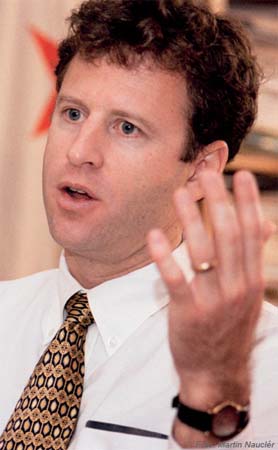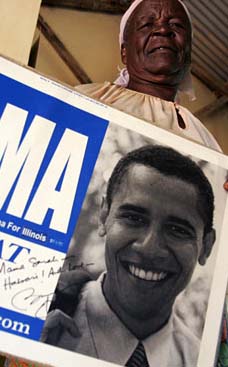
According to press reports, the Bush administration is pursuing a final bold foreign policy move in its last weeks. Bypassing normal procedures, it wants European allies and Canada to agree to offer Georgia and Ukraine rapid membership into NATO. This is a singularly bad idea, much more likely to worsen U.S.-Russia relations and increase the risk of war than to do any real good for the new democracies of Central Europe. NATO has a membership path that is well-designed and well-conceived. Among other things, it calls for the clear establishment of democratic rule among aspiring member states, as well as a policy of settling territorial disputes without the use of force. Today, neither Georgia nor Ukraine (nor Russia) qualifies based on these criteria. We should stick to the established policy, and slow things down. Michael O'Hanlon, a Senior Fellow at the Brookings Institute and a Visiting Lecturer at Princeton University, served as a Peace Corps Volunteer in Congo Kinshasa.
Michael O'Hanlon writes: Don't rush Georgia and Ukraine into NATO
O'HANLON: Don't rush Georgia and Ukraine into NATO
Michael O'Hanlon
Tuesday, December 2, 2008
According to press reports, the Bush administration is pursuing a final bold foreign policy move in its last weeks. Bypassing normal procedures, it wants European allies and Canada to agree to offer Georgia and Ukraine rapid membership into NATO.
This is a singularly bad idea, much more likely to worsen U.S.-Russia relations and increase the risk of war than to do any real good for the new democracies of Central Europe.
The idea might seem a natural response to Russia's brutal invasion of Georgia in August, by any measure a disproportionate and unwarranted action in response to tensions over the breakaway provinces of South Ossetia and Abkhazia. But as most now realize, Russia's aggression, while unjustified, was not unprovoked. Among other things, Georgia had fired artillery rounds carelessly into disputed regions at the outset of the crisis. President Mikhail Saakashvili's desire to reintegrate South Ossetia and Abkhazia back into Georgia proper, while understandable at one level, has been pursued with wanton disregard for the role of the international community and for the need to pursue this goal carefully and peacefully. Future policymaking must seek to deter not only Russia, but other regional actors, from the kind of irresponsible behavior that pushed the Caucasus toward all-out war just three months ago.
Secretary of State Condoleezza Rice and Defense Secretary Robert Gates are experienced Russia hands. But they seem to operate too much from a classic deterrence model of international relations. By quickly putting Georgia and Ukraine under NATO's Article V security guarantee, they seem to hope Prime Minister Vladimir Putin and President Dmitry Medvedev of Russia would back off, recognizing that to pick a fight with Georgia or Ukraine would be to pick a fight with the United States.
If Russia today was like Adolf Hitler's Germany, or Josef Stalin's Soviet Union, or we might have little choice in the matter. But few would argue such a model explains Russia's current behavior. Perhaps the logic is that, even if Russia is only bent on reasserting its sphere of influence among the former Soviet republics and vassal states, it is still better to nip any bullying in the bud. That is a fair enough hypothesis - even if one can debate whether the stakes are high enough to warrant an implicit threat of war against a nuclear-armed state in its own backyard in response. But will it work using NATO membership as our primary policy tool?
To answer that important question, it is worth going back to the exact language of Article V of the NATO Charter. Its precise wording is as follows: "The Parties agree that an armed attack against one or more of them in Europe or North America shall be considered an attack against them all and consequently they agree that, if such an armed attack occurs, each of them, in exercise of the right of individual or collective self-defense recognized by Article 51 of the Charter of the United Nations, will assist the Party or Parties so attacked by taking forthwith, individually and in concert with the other Parties, such action as it deems necessary, including the use of armed force, to restore and maintain the security of the North Atlantic area."
Here's the problem with Article V. It has long been presumed to constitute an implicit threat to use force nearly automatically in the event allies are threatened - and there is a very real danger that President Saakashvili of Georgia would interpret it that way, feeling even more unbound to challenge Russia once inside the alliance.
But in fact, Article V does not requirea military response, and wily characters like Mr. Putin and Mr. Medvedev would likely figure that out. Even if they did not want to challenge us blatantly by overthrowing Mr. Saakashvili in the future, they could quite likely pick future fights with him over borders, or the treatment of minorities, or other such issues - calculating that American and other alliance leaders would not risk nuclear war over small parts of central Eurasia that few Americans had ever heard of. And they would probably be right. By this analysis, the net effect of premature NATO membership for Georgia and Ukraine could well be to make war morelikely, not less likely. And once we were on this slippery slope in a future crisis, with Article V gradually losing its credibility, there could also be a risk of NATO overreaction, as we sought to shore up our international credibility by forcing a direct showdown with Russia from which no one would benefit.
NATO has a membership path that is well-designed and well-conceived. Among other things, it calls for the clear establishment of democratic rule among aspiring member states, as well as a policy of settling territorial disputes without the use of force. Today, neither Georgia nor Ukraine (nor Russia) qualifies based on these criteria. We should stick to the established policy, and slow things down.
The United States in particular must not foster an attitude among Russians that NATO is designed explicitly to weaken them, or that other key foreign policy initiatives such as the planned missile defense bases in Poland and the Czech Republic are pursued at their expense. Alas, two decades into the post-Cold War era, we have not succeeded in this task. To be sure, cynical and ruthless Russian politicians are the primary problem here. But they are not going away anytime soon. And we are doing just enough to feed their worldview - such as White House Press Secretary Dana Perino's regrettable comment in August that our decision to firm up plans for the Poland and Czech missile defense system in the midst of the Georgia crisis was "mostly coincidental," after we spent years telling Russia it was not in any way designed against it. Moscow will interpret suspending normal NATO membership rules for Georgia and Ukraine as punishment, not statesmanship.
The best Russia policy now is to avoid further unnecessary provocation on all sides, and give President-elect Obama a chance to work with NATO allies to devise a more patient Russia strategy next year. This is the kind of calming advice we tend to give to other countries in crises like the current one. We should heed our own counsel.
Michael O'Hanlon is a senior fellow at the Brookings Institution.













